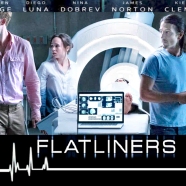 October
12
October
12
Tags
Flatliners (2017)

Nothing seems to anger the crowd more than a filmmaker who tries to improve on an original. After twenty-seven years, Flatliners (2017) is back with the same story but instead of a science-fiction horror it has been updated into a fictional science thriller. If you consider this film on its own merits and not dwell on how or why it is different from the original, this is an intriguing story with the potential to raise several complex issues about death and redemption.
By now the basic storyline is well known. Four out of a group of five friends who are medical students have their hearts stopped for a few minutes to experience death and peer into the beyond. The fifth is the group’s sceptic and conscience. Over several days, these gods-in-training take turns dying in an isolated basement ward, avoiding detection by hospital authorities. They record each person’s brain activity which shows elevated electrical disturbance in the minutes after death. Each of the four episodes encounters an emergency in the revival process and each has a heightened awareness or an enhanced ability after the experience. They also experience a flashback vision of a past mistake or error of judgement that must be confronted, and deal with it according to stereotype (spoilt rich kid versus poor kind girl). Of course, when you play with death anything can happen and each has a different demon to handle.
The film’s high-concept premise is the main star of the show: the cast are merely automatons who repetitively carry out the same scenario. The idea that it’s possible to see what exists after our heart stops has preoccupied writers and artists since the dawn of time. The medical science constructions placed around this story give it some degree of plausibility and the psychological trauma that follows each person’s experience are variations on the theme of ‘last-chance for moral redemption’. Given the constraints of the storyline, the acting is mechanical, clichéd, and unremarkable. But that’s not the film’s major problem: seeing the film’s premise repeated four times makes it tedious and takes away its only chance of developing any rising tension. By the time the last person is ‘put to death’ the film itself has irretrievably flat-lined and limps its way to a corny finalé.
It did not have to be this way. Regardless of how Flatliners (2017) differs from Flatliners (1990) there was ample opportunity to take the new version to a higher level. Today’s secular millennials are more aware than any generation before it and are curious to explore meanings of life from the perspective of death. The idea that in the twilight between life and death our worst sins come back to haunt us is not a spiritual or paranormal notion but one of earthly morality and redemption. But the film has no serious intentions. Like the young people it depicts, Flatliners (2017) is about thrills not intelligent discourse. In the end, the film gives us neither.

Director: Niels Arden Oplev
Stars: Ellen Page, Diego Luna, Nina Dobrev, James Norton

I decided to skip seeing this. I am not that keen on the original, although I’ve seen it on TV. Your review has reassured me that I made a good decision.
LikeLiked by 1 person